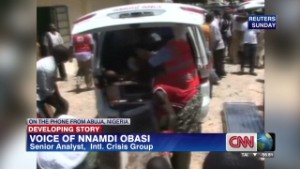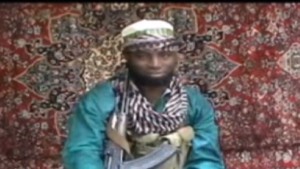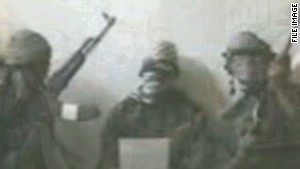The two groups join a list of "Foreign Terrorist Organizations"
that includes al Qaeda, Hamas, the Real Irish Republican Army and many
others. Being so named means the United States can freeze such
organizations' assets, impose travel bans on their known members and affiliates, and prohibit Americans from offering material support.
U.S. officials told CNN
Tuesday this move was coming against both organizations, who have been
in the news in recent years for various attacks.
The United States says Boko Haram has killed thousands since 2009. Human rights groups put the figure at more than 3,000.
 Students massacred in Nigeria
Students massacred in Nigeria
 Boko Haram threatens U.S. in video
Boko Haram threatens U.S. in video
 2012: Who are Boko Haram?
2012: Who are Boko Haram?
Boko Haram, which means
"Western education is sacrilege" in the Hausa-Fulani language, has
launched a self-described "war on Christians" and seeks to impose a
strict version of Sharia law across northeastern Nigeria, if not the
entire country.
It has attacked various
targets in the West African nation since its formation in the late
1990s, according to the U.S. National Counterterrorism Center. This includes killing and kidnapping Westerners, and bombing schools, churches and mosques, the center said.
In August, militants allegedly went into a mosque in Borno state and killed 44 worshipers.
The group released a
video boasting it was growing stronger and had launched attacks in
Benisheikh in September that the State Department said left 160
civilians dead, many of them Muslim women and children.
In recent months, it has stepped up attacks against students at English-language schools.
In September, the State Department said Boko Haram attacked an
agricultural school, killing 50 students in their dorm as they slept.
Earlier this month, the
United Nations warned that the extremist group could be found guilty of
crimes against humanity after it launched a brutal attack on a wedding party that killed more than 30 people.
The U.N. refugee
agencies estimates more than 8,000 people in Nigeria have fled into
neighboring Cameroon to escape the escalating violence and another 5,000
have become internally displaced.
While the group's principal focus is Nigeria, the United States cites links to the al Qaeda affiliate in West Africa,
and extremist groups in Mali. Gen. Carter Ham, then the commander of
U.S. Africa Command, has warned Congress that Boko Haram elements
"aspire to a broader regional level of attacks," including against
United States and European interests.
A Boko Haram suicide
attack on the United Nations building two years ago in the Nigerian
capital of Abuja killed at least 25 people.
In June 2012, the State
Department added several of the group's members to a terrorist
blacklist, including its new leader Abubakar Shekau, who has a $7
million bounty on his head.
As to Ansaru, it has gone after Nigerian military and Western targets, according to the State Department.
This includes a November
2012 raid on a police station in Abuja that killed Nigerian police
officers and sprung free several terrorists.
The State Department
also blames Ansaru for kidnapping foreigners who live and work in the
African nation plus attacking a convoy of Nigerian peacekeepers.
The decision to designate Boko Haram and Ansaru as terrorist organizations followed a robust debate.
The administration faced intense pressure from Congress and some officials to list the groups, given their history of violence.
Other officials and
experts warned they did not pose a threat to the United States, adding
that designating them as terrorist organizations could make Washington
more of a target. And some officials argued the Nigerian government
could interpret the decision as an American green light to continue its
heavy-handed crackdown on the organization.
Nigerian President
Goodluck Jonathan stepped up a military campaign against the group six
months ago, declaring a six-month state of emergency in May in the three
northeastern states worst hit by the violence.
Recent Amnesty
International and Human Rights Watch reports accused the Nigerian
military of human rights abuses and violations when conducting
operations against the group. The U.N. said it is investigating the
claims.
The State Department hinted at this issue in its announcement designating Boko Haram and Ansaru as terrorist groups.
"All of our assistance
to Nigeria stresses the importance of protecting civilians and ensuring
that human rights are respected," the State Department said. "That
assistance and these designations demonstrate U.S. support for the
Nigerian people's fight against Boko Haram and Ansaru."
No comments:
Post a Comment